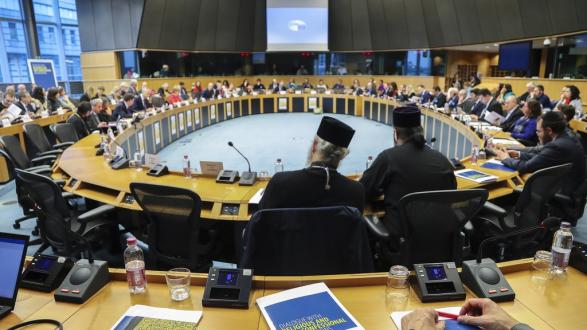Monya Kian has been a Pacific Council member since 2016 and currently serves as the Domestic Program Director at the Whitaker Peace & Development Initiative, a global non-profit organization. She focuses on developing programs that promote conflict resolution, particularly in schools.
Previously, she held other positions spanning the non-profit and business consulting sectors, working alongside a wide range of experts—from international entrepreneurs to local leaders in public schools and law enforcement—to spearhead and manage innovative social impact projects. She possesses a Masters in Peace and Justice Studies from the University of San Diego, a Bachelors in International Studies with Distinction (Minor in Human Rights) from the University of Washington, and a diploma from the Paris Institute of Political Studies (Sciences Po) in France.
Kian recently spoke with the Pacific Council about micro and macro conflict resolution.
_____________________
Pacific Council: Can you tell us about your transition out of academia into the workforce? What advice do you have for younger professionals beginning their careers?
Monya Kian: For me it was a combination of things. Establishing my academic foundation was very important. I knew I wanted to work in the field of peace and conflict resolution. When I was a graduate student I decided not to take an academic course, and instead pursued an internship. It really opened the door for me and gave me so many real-world skills.
After that, it was about networking. Being out there, "showing up" as they say, is definitely advice I would give to younger people—not just to get a job but to get a sense of what the real world is like and what communities need. I also participated in conferences and informational interviews. All of that combined was important for me to get a sense of what I wanted to do.
What does your role at the Whitaker Peace & Development Initiative (WPDI) look like now?
I’ve been at WPDI since 2012 when it was created. Originally my job was to help design curriculum and help the foundation grow. I travelled to conflict zones as it was important for me to work with our team to assess the needs on the ground and then help the foundation design initiatives around those needs. Since then, WPDI has hired experts on the ground, and now my focus is on conflict resolution programs in schools in Los Angeles.
I work with educators and students to promote conflict resolution education in their academic work, and hopefully change the way that they see conflict. At the end of the day, conflict is about people. Having tools to better handle conflict can potentially help a lot of students. We want to change the way students view conflict, and give them skills to handle it constructively.
What role does water and climate change play in modern conflict?
My personal belief is that climate change is real, and as a result we are seeing fluctuation in rainfall and experience quicker evaporation rates. Unfortunately, we see this happening in areas where they are already fighting over water such as the Middle East and Sub-Saharan Africa. Conflict over this valuable resource has always been prevalent, and now with climate change it will increase. A reasonable solution lies within innovative technologies, such those that purify waste water and desalinate at a low cost.
Tell us about the Domestic Harmonizer Program.
The Domestic Harmonizer Program is the program that I lead here in Los Angeles. It is focused on integrating conflict resolution in the core academic focus of students with the aim of changing how youth deal with conflict. Bullying, violence, and various disputes pose challenges for youth everywhere. These issues have the potential to escalate and impact a person for years. We want to help students and teachers deal with these challenges in constructive ways by promoting skills such as negotiation, peer mediation, and restorative justice.
How much of WPDI’s work is preemptive and preventative, as opposed to responding and reacting to crises?
The program that I am managing here in LA is preventative and after-the-fact. We have a curriculum to create a culture of peace at school so they have tools to manage conflict before it happens. However, when conflict does escalate, we have peer mediation programs so students can resolve student-based conflict. Rather than expelling or suspending students, we invite them to come to peer mediation so they can get to the root of what happened so that it does not become a group fight.
Globally, our Youth Peacemaker Network program empowers youth through our Train-the-Trainers model that’s based in South Sudan, Uganda, and Mexico. We train youth leaders on the ground in conflict resolution and business skills so that they can teach others how to resolve conflict, and also create for-profit businesses. We also have Community Learning Centers for people in those conflict-affected areas to come and benefit from classes and free access to technology. At WPDI, we want to constructively address conflict, and provide tools to deal with other challenges such as poverty.
What are some early warning signs of conflict?
It’s important to look at sources of conflict to predict where a conflict will happen. A region’s history and scarcity of resources—such as water—can often exacerbate tensions. Cultural and religious differences can also contribute to conflict, but rarely are they the sole source of a conflict. A final aspect to keep in mind are political structures: unstable and corrupt governments, and those that support inequality in some way, allow opportunities for violence to arise.
_____________________
The WPDI offers volunteer opportunities for members with background in fundraising, education, digital app creation, and video animation. Get in touch with Monya if you’re interested in learning more about her work by emailing us at engage@pacificcouncil.org.
Learn more about the Pacific Council’s Global Water Scarcity Project and Mexico Initiative.
The views and opinions expressed here are those of the speaker and do not necessarily reflect the official policy or position of the Pacific Council.




